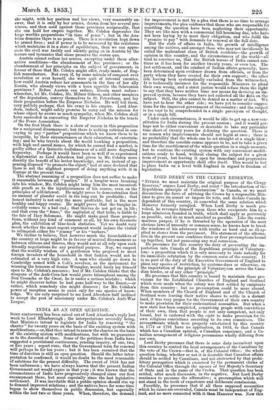INDIA AS AN OPEN QUESTION.
SOME controversy has been raised out of Lord Aberdeen's reply last week to Lord Ellenborough ; the interpretations severally being, that Ministers intend to legislate for India by renewing " the charter" for twenty years on the basis of the existing system with modifications,—or, that they intend to renew the charter on the basis of the existing system with modifications, but with no guarantee as to the duration of time. Some of the petitions from India have suggested a provisional continuance, pending inquiry, of one, two, or five years ; report runs, that the Government term for renewal will perhaps be for ten years ; but it has been surmised that the time of duration is still an open question. Should the latter inter- pretation be confirmed, it would no doubt be the most reasonable of solutions for the present difficulty. The event of 1854 has not been unforeseen ; we have always known that the present Indian Government act would expire in that year ; it was known that the circumstances of India have progressively changed since our first encampment there, but most especially since the last legislative settlement. It was inevitable that a public opinion should rise up to demand improved relations ; and the natives have for some time begun to show themselves in public discussion, but especially, within the last two or three years. When, therefore, the demand
for improvement is met by a plea that there is no time to arrange improvements, the plea confesses that those who are responsible for resettling the question have been neglecting their opportunity. They are like men with a commercial bill becoming due, who have not been laying by to meet their obligation, and who fulfil the "promise to pay " with demands for renewal at the full date. But the state of affairs in India, the growth of intelligence among the natives, and amongst those who may not invidiously be called the malcontent class of British residents—the growth of opinion in this country, and the circumstances of the world—all tend to convince us, that the British tenure of India cannot con- tinue as it has been for another twenty years, or even ten. The last settlement, and the conduct of Indian affairs generally, have been determined upon evidence drawn from officials, or from the party whom they have created for their own support ; the other side having been systematically excluded from the witness-box. It is technically incorrect for the responsible Ministers to plead their own wrong, and a strict justice would refuse them the right to say that they have neither time nor means for devising an im- proved system, because they have not collected all the data on the subject. Still, the plea cannot be denied as a matter of fact. We have.yet to hear the other aide; we have yet to consider sugges- tions for the improved government of the country; and the subject is too vast to be comprehended in a single paroxysm of thought, or in a single bill.
Under such circumstances, it would be idle to get up a new con- stitution for India during the present session ; and it would per- haps not be either convenient or desirable to take any particular time short of twenty years for deferring the question. There is no reason why improvements should not begin at once ; there is no probability that the whole can be set straight at a single blow ; and therefore the sensible course appears to be, not to take a given time for the resettlement of the whole question in a single measure, but to continue the existing system with any convenient modifi- cations ready to hand, without closing the subject for a given term of years, but leaving it open for immediate and progressive improvement as opportunity shall offer itself. This would be but to place India on a level with England in regard to freedom of legislation.
























 Previous page
Previous page